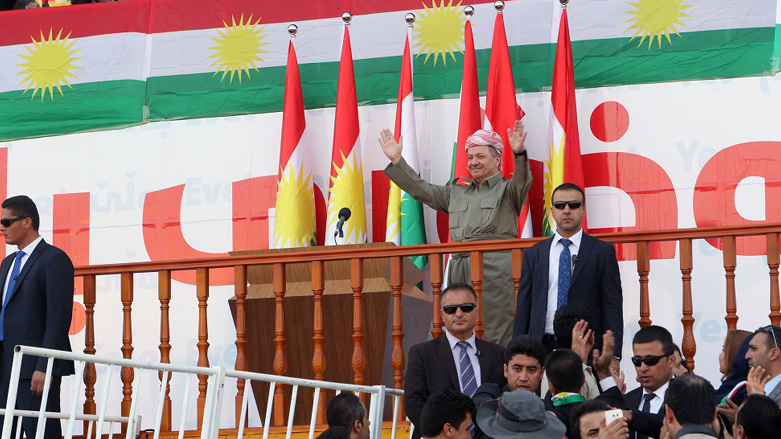Bernard-Henri Levy: the US misjudged the “Old Lion of Kurdistan”

Listening to Kurdish President Masoud Barzani, “I can’t help but think of all the small men who, right up to the last minute, speculated from their desks in embassies and foreign offices that [he] would agree” to delay the independence referendum.
So writes the distinguished French philosopher, Bernard-Henri Levy, in Tablet magazine about his recent interview with the Kurdish President, which was conducted during Levy’s recent visit to the Kurdistan Region to observe the independence referendum.
“I’ve been fighting for half a century,” Barzani told Levy. “With my people, I have been through mass killings, deportations, gassings. I remember times when we thought we were done for, headed for extermination.”
In believing that Barzani would agree to postpone the referendum at US insistence, Washington failed to “take into account the invincible pride of the old lion of Kurdistan,” Levy writes.
The deal that the US proposed a mere five days before the referendum, carried to Erbil by Special Presidential Envoy for the Global Coalition to Counter ISIS, Brett McGurk, reflected “no understanding of the core idea that haunts [Barzani], an idea that gives meaning, not only to his own life, but to his people’s destiny.”
Levy, a long-time advocate for smaller nations whose aspirations major powers often find inconvenient, understands such passions. In the 1990s, he worked vigorously on behalf of Bosnian Muslims, receiving a medal from Bosnia's president Alija Izetbegovic after the one-time Yugoslav territory became an independent country.
Levy’s perspective is strongly influenced by his Judaism and the millennial-long suffering of the Jews in exile until 1948 when Israel declared its independence, the same year in which Levy was born in French Algeria.
Levy asked Barzani if he was worried about the various threats coming from the Kurdistan Region's neighbors.
The Kurdish President appeared unfazed. “The ramping up [of their threats] has just begun. And I hope with all my heart that they won’t carry it through,” he told the French philosopher.
But if they do, “We’ve seen others like them. We’ve been tortured, gunned down, displaced,” Barzani explained.
“Burned into the memory of every one of us is first-hand knowledge of the worst that man can do to man,” he said. “Suppose our neighbors follow through on their threats, will the international community stand by and watch us be strangled?”
“Will they just take in the show, as they did when we were gassed?”
“Throughout this conversation,” Levy writes, “I sense Barzani’s determination to counter with unshakeable calm the feverishness of the Baghdad-Ankara-Tehran trio.”
However, as Barzani emphasized, “We seek negotiation and dialogue. We are ready to repeat, over and over, that the independence we seek is for the Kurds of Iraq.”
“We have no intention of getting involved in the affairs of neighboring countries.”
President Barzani revealed to Levy, “I emphasized this to President [Emmanuel] Macron, when he called me last week upon his return from New York. He was amicable. He understood.”
Levy responded that he knew Macron “had offered France’s services as a mediator” and was prepared to invite both the Kurdish President and Iraqi Prime Minister to Paris for discussions. Barzani expressed his ready willingness to participate in such talks.
Levy earlier directed a documentary film “Peshmerga,” which was honored with a special screening at the Cannes film festival in 2016. The film depicts men and women who strive for an “enlightened,” tolerant Islam, he said.
Writing in the Wall Street Journal in September 2015, Levy predicted the eventual defeat of the Islamic State (IS.) He had just returned from filming on the front lines with the Peshmerga and explained that the Kurdish fighters were far more strongly motivated than the IS militants.
“Fewer [IS fighters] than many think are able to say convincingly why they fight, whereas the Kurds are defending their land and an idea, the dream of a country of their own and a model of society that is unique in the region,” Levy wrote.
IS “will be defeated, because they are facing an increasingly professional army composed, exceptionally, of men and women of all ages and circumstances, many of whom left behind successful civilian lives.”
While in Erbil for the independence referendum, Levy spoke with Kurdistan 24, “This is not just the birth of a nation, but of a democratic nation,” he proclaimed.
He criticized the international response to the referendum, saying, “The international community has been blackmailed by the Islamist Republic of Iran, the Islamist regime of Erdogan, and by the failed state of Iraq.”
“But deep down in their hearts, most of the democracies in the world are on the side of the Kurds,” the French philosopher affirmed. “They know you are right and on the right side of history.”
Editing by G.H. Renaud
